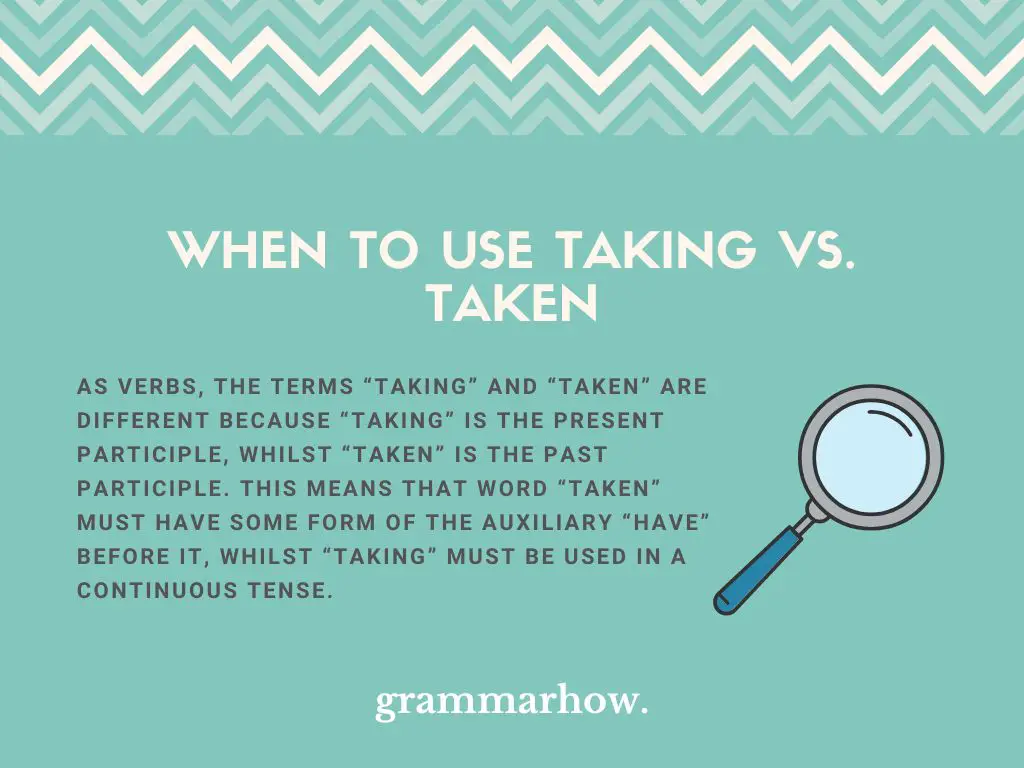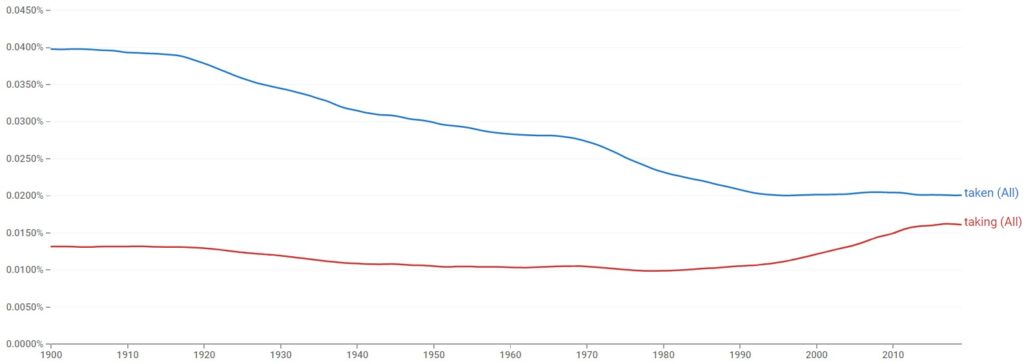The two verb forms “taking” and “taken” and when to use each can be confusing for learners of English. This page clarifies precisely what each form represents and shows how to use them both in example sentences.
When to Use Taking vs. Taken
As verbs, the terms “taking” and “taken” are different because “taking” is the present participle, whilst “taken” is the past participle. This means that word “taken” MUST have some form of the auxiliary “have” before it, whilst “taking” must be used in a continuous tense.

“Taken” and “taking” are two verb forms of the word “take.” However, “taking” can also be a noun, like:
- The taking of the money was his most serious crime.
The word “taken” is always used with a “perfect” tense, which means it MUST have a form of “have” before it, and it must be referring to something that started in the past and has a connection to the present.
Also, passive sentences in any tense would use the word “taken”:
- Active – Simple Past – She took the ball home
- Passive – Simple Past – The ball was taken home
In contrast, the verb form “taking” in active can refer to the past, present, and future.
In the rest of the article, you can learn more about when to use “taking” and “taken.”
Taking
The word “taking” is both a continuous form of the verb “take” and also a noun to refer to the act of “taking” something.
The Cambridge Dictionary shows that there are many circumstances in which “taking” can be used, as shown in the examples below.
As a verb, you can use “taking” in the following ways:
| Present Continuous | I am taking lots of medication at the moment. |
| Past Continuous | She was taking a shower when you called. |
| Present Perfect Continuous | She has been taking my things all my life. |
| Past Perfect Continuous | She had been taking driving lessons for six months when she passed her test. |
| Future Continuous | Will you be taking any holiday next year? |
| Future Perfect Continuous | How long will you have been taking anti-depressants by the time you come off them? |
“Taking” can also be used as a noun. At the end of each sentence, it shows what the word “taking” refers to:
- The weekly takings of the shop were $3000. (Revenue)
- The taking of the painting was a shock to the art world. (Theft)
- The taking of life is one of the most severe crimes. (Murder)
- The job is yours for the taking. (It is easily available to you)
Taken
The word “taken” has several different uses, according to the Cambridge Dictionary. However, its primary function is to be the past participle of the verb “take.”
Therefore, it is used in the verb tenses shown below and in passive sentences of all tenses:
| Present Perfect | I have taken two tablets already. She has taken all my food, and now I have nothing. |
| Past Perfect | I had taken the test before but failed twice. |
However, “taken” can also be used in active sentences. Here are some examples of how “taken” can be used in both active and passive voice:
| Active | Passive |
| She is taking an IT course. | An IT course is being taken by her |
| She has been taking an IT course for two months. | An IT course has been taken by her for two months |
| She had been taking the course for two months when she passed. | The course had been taken for two months when she passed. |
| Will you be taking another course afterwards? | Will another course be taken afterwards? |
| How long will you have been taking that course by the time you finish? | How long will that course have been taken by the time you finish? |
Two other uses of the word “taken” with slightly different meanings are shown below:
“Taken” also means that you think something deserves your “respect or admiration” or that it is “incredibly charming.”
- I was taken by his smooth talking and charming personality.
- She was taken by how well he spoke at the conference.
- We were very taken with your idea.
Or, when combined with the word “aback”, it means “shocked or surprised.”
- I was taken aback by what she asked me.
- I was taken aback by how much the meal cost.
Which Is Used the Most?
The Google Ngram shows us that “taken” has always been more common than “taking”. However, the difference between their frequency has reduced substantially over the last 100 years and is now minimal.

Taken or Taking Care Of?
Both “taken care of” and “taking care of” are correct; the only difference is that one is for certain verb tenses and the other is for others. Essentially the difference is that with “taken”, the act of “caring” has already happened, whereas with “taking”, the act of “caring” is still in process.
As shown in the examples:
- She has taken care of him for six months.
- She has taken care not to make any mistakes.
- I have been taking care of my sister all day.
- I am taking care of my sister at the moment.
Taking Place or Taken Place?
The term “take place” basically means “to happen”, and the difference between “taken place” and “taking place” is that “taken place” means it has already happened, whereas “taking place” means that it is happening right now in the present or will happen in the future.
As shown in these examples:
- The party is taking place on Friday at my house.
- The event had already taken place by the time he arrived
- The World Cup has taken place in over ten countries.
- The next World Cup will be taking place in Qatar.
Final Thoughts
The words “taking” and “taken” as verbs basically refer to different times. “Taken” is used with passive sentences, plus with present and past perfect, whereas “taking” is used with continuous tenses or as a noun to refer to the act of “taking” something.

Martin holds a Master’s degree in Finance and International Business. He has six years of experience in professional communication with clients, executives, and colleagues. Furthermore, he has teaching experience from Aarhus University. Martin has been featured as an expert in communication and teaching on Forbes and Shopify. Read more about Martin here.
